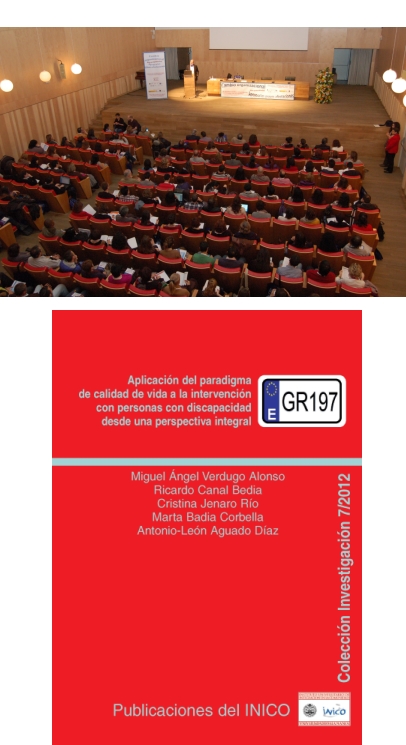Update from AUCD International Affiliate, Institute on Community Integration (INICO) at the University of Salamanca, Spain
May 4, 2012

|
In recent months four significant events have taken place in the Institute on Community Integration (INICO) at the University of Salamanca.
First, the INICO recently celebrated the "Eighth Scientific Conference on Disability Research." This is an international conference on research and disability that INICO organizes every three years. It is probably the main forum for scientific exchange on disability in Spain and a key reference in Latin America and Portugal. This latest edition focused on "Organizational Change and Support to People with Severe Disabilities. Two priorities." With a total of nearly 270 entries grouped in about 125 activities, and an attendance of 700 participants, main international interventions included the participation of Robert L. Schalock and Marc J. Tassé. Robert L. Schalock, internationally renowned scientist, has been collaborating with the INICO since 1995 and in 2006 the University of Salamanca declared him Doctor honoris causa. Marc J. Tassé, director of Ohio State University's Nisonger Center, is also a renowned scientist who also collaborates with the research activity of INICO. This congress has resulted in a high participation level and interest of the subjects.
The second relevant milestone was the completion of project "Implementation of the quality of life paradigm for intervention with people with disabilities from a holistic perspective" developed in the INICO by a research team that holds the "Group Research Excellence" recognition by the Agency for Quality in the University System (Agencia para la Calidad del Sistema Universitario). This project, with a three years duration, has six sub-unit on the following topics 1. - Development of an instrument for assessing quality of life for people with intellectual disabilities, 2. - Implementation with families in relation to autism early diagnosis, 3. - Self-Determination assessment in secondary education, 4. - Quality of work life in adults with disabilities, 5. - Quality of life and integrated leisure, and 6. - Quality of life and ageing. This research's results have come together in a book published by the INICO "Application of the paradigm of quality of life intervention with people with disabilities from a holistic perspective" (Aplicación del paradigma de calidad de vida a la intervención con personas con discapacidad desde una perspectiva integral).
The third important event was the renewal in times of economic crisis in the agreement that allows the development of "Disability Information Service, SID" (Servicio de Información sobre Discapacidad). The SID is an statewide disability information service, promoted jointly by the Government of Spain and the University of Salamanca. It is a stakeholder of the Spanish Network of Disability Information and Documentation (Red Española de Información y Documentación sobre Discapacidad), REDID. Its aim is to collect, organize and disseminate information on disability, including disability policies promoted by the Spanish Government. With more than 136,000 records, about 12,000 daily visitors and about 300,000 daily visits, the SID has been making great efforts to maintain its position in major search engines and make a comprehensive and accessible content offer. To this end, recent developments have served to introduce SID into social media with nearly 10,000 pages served by them, mainly from Facebook with more than 2,000 followers.
Finally, fourth remarkable, the INICO has undergone an evaluation by the Agency for Quality in the University System of the activity in the period 2006-2010. This assessment involves maintenance or loss of the recognition of University Research Institute in the University System in Spain. Result has been quite satisfactory, since the INICO scored 70.41 points out of 100. The evaluation committee considered among the main strengths of INICO their research groups gathered around a common interest and a common paradigm. These groups enable the provision of research projects funding that allows financial sustainability of the Institute. Reliability and quality of training programs and actions and forums dedicated to knowledge transfer were also assessed, and highly valued. Within identified weaknesses, lack of infrastructure for developing INICO activities and limited funding from public administration were also ascertained. It was also found that although international projection and scientific production dissemination at this level have increased and are valuable, efforts should be made for the increase of publications in international impact journals, as well as participation in transnational research projects. The AUCD is definitely a great platform for INICO in this regard.







